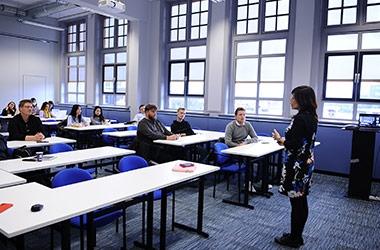Wittenborg Hosts Erasmus+ Event about Circularity in Furniture Industry

INFURI Meeting Connects Project Partners and External Community
Between 5 and 6 April, Wittenborg hosted an event aimed at showcasing the results of the Erasmus+ international project “Innovation in the Furniture Industry in the Era of Circular Economy” (INFURI). In line with the research initiative, the event focused on promoting circularity practices to small and medium-sized furniture companies and was attended by local enterprises, researchers, students from different schools and representatives of vocational, educational and training organisations.
In total, approximately 35 people participated in the activities, which included a presentation about INFURI, a lecture that introduced the Erasmus+ programme and a talk by entrepreneur and engineer Boris Fartek representing Slovenian company Mizarstvo Ornik, one of the project’s partners. In his case study, Fartek explained how Mizarstvo Ornik transitioned from a traditional business model to circularity, detailing the production processes that have been adopted by the small company as well as the business, financial and environmental benefits of these practices. The event also included two internal meetings in which project partners discussed the latest developments and current goals.
INFURI partner Irene De Laurentiis, representing Italian learning centre CIAPE, said that she decided to participate in the event on-site because it was a good opportunity to travel abroad and meet partners after interacting virtually for more than a year. “I am very happy with the progress of the project so far and the partners are very competent,” she stressed.
Iranian MBA student Mahsa Davoudi, specialising in Sports Business Management at Wittenborg, said that she has been interested in sustainability in the furniture industry since when she was studying for a master’s degree in Architecture in Iran. “I plan to design, build and manage my own sports complex in a sustainable way, and that is why I decided to attend this event. It was great and, among other things, I learned more about how to develop a start-up in the Netherlands. The presentation by the Slovenian furniture company was also very interesting and insightful.”
For Ural Erselcuk, who is pursuing an MBM degree in Entrepreneurship & Innovation, the event was relevant because, apart from his studies, he also works as a contractor operating closely with furniture manufacturers. “The most inspiring part for me was the presentation by the company, which helped me understand how they are adopting this sustainable approach to their activities, and gave me ideas on how I can also follow this path,” he said.
Researching Circularity

Launched in December 2020, INFURI is a 30-month project set to last until May 2023. The initiative is coordinated by Wittenborg and includes, in total, nine partners from seven European countries: the Netherlands, Greece, Poland, Italy, Slovenia, Spain and Portugal.
According to Wittenborg EU project coordinator Aydan Ismayilova, apart from being connected to the adoption of the UN’s Sustainable Development Goals (SDGs) by Wittenborg, INFURI is aligned with two of the school’s pillars: internationalisation and ethics. “It promotes internationalisation because it involves stakeholders from multiple countries, and participants are able to exchange their knowledge and learn from experiences that are taking place in different parts of Europe. On top of that, the project is also connected to ethics because ethics also concerns sustainability,” she said.
Ismayilova highlighted that the project has been developing multiple research outputs with the goal of disseminating circularity practices in the furniture industry.
“In September 2021, we published a research paper that analyses 36 furniture companies, focusing on the barriers they face or think they might face in the transition to a circular business model. Currently, we are developing open-access courses that will be made available on Udemy, so that anyone who is interested in circularity in the furniture industry, as well as teachers and instructors, can use this material. And we will soon start working on a book that is a collection of case studies, with information provided by all of the project’s partners. This will also be useful for students, teachers and researchers.”
WUP 25/4/2022
by Ulisses Sawczuk
©WUAS Press
- Log in to post comments
